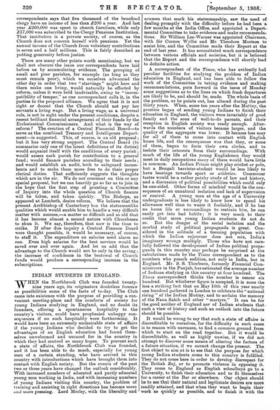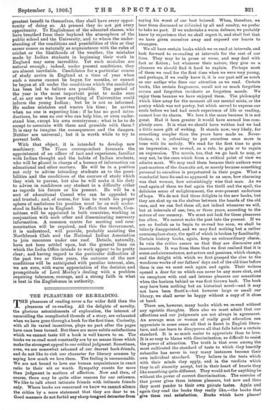INDIAN S1 UDENTS IN ENGLAND.
WHEN the Northbrook Club was founded twenty- nine years ago, its originators doubtless foresaw as possibilities some of the facts of to-day. The Club came into existence with the purpose of providing a con- venient meeting-place and the comforts of society for young Indians studying in England, and no doubt its founders, offering a spontaneous hospitality to the country's visitors, could have prophesied unhappy con- sequences if no such hospitality were forthcoming. It would have been an extremely undesirable state of affairs if the young Indians who decided to try to get the advantages of an English education had found them- selves unwelcomed and unca,red. for in the country in which they had centred so many hopes. To prevent such a state of affairs, the Northbrook Club was founded, and it has been able to do much, especially for young men of a certain standing, who have arrived in this country with introductions which have brought them into contact with English society. But the events of the past two or three years have changed the outlook considerably. With increased numbers of educated and partly educated young men working in India, and with increasing numbers of young Indians visiting this country, the problem of raining and assisting in right directions has become more and more pressing. Lord Morley, with the liberality and acumen that mark his statesmanship, saw the need of dealing promptly with the difficulty before he had been a few months at the India Office, and appointed a Depart- mental Committee to take evidence and make recommenda- tions. Sir William Lee-Warner was appointed Chairman, with Sir Curzon Wyllie and Mr. Theodore Morison to assist him, and the Committee made their Report at the end of last year. It has necessitated much correspondence between various officials and societies, but it is believed that the Report and the correspondence will shortly lead to definite action.
A correspondent of the Times, who has evidently had. peculiar facilities for studying the problem of Indian education in England, and has been able to follow the work of the Committee in taking evidence and making recommendations, puts forward in the issue of Monday some suggestions as to the lines on which fresh departures are likely to be, and should be, made. The whole basis of the problem, as he points out, has altered during the past thirty years. When, some ten years after the Mutiny, the practice began of sending young Indians to finish their education in England, the visitors were invariably of good family and the sons of well-to-do parents, and their reception in English society was ready enough. After- wards the numbers of visitors became larger, and the quality of the aggregate was lower. It became less easy for all of them to come into contact with English home life, and the consequence was that they, or some of them, began to form their own circles, and to isolate their interests from their surroundings. With much of the life of the young Englishmen they would meet in daily occupations many of them would have little in common. An Indian Prince might play cricket or polo, but a Bengali barrister-student would be less likely to have leaninas towards sport or athletics. Commoner tastes would be a rather patchy study of law and history, and a discussion of political possibilities which could only be one-sided. Other forms of mischief would be the con- sequence of an unnatural isolation and lack of supervision or control. A young man at the age of a University undergraduate is less likely to know how to spend his allowance well than to waste it foolishly, and if he has no home life or surroundings to restrain him, he can easily get into bad habits ; it is very much to their credit that more young Indian students do not do so. But the danger of the social isolation and the morbid study of political propaganda is great. Con- sidered in the solitude of a teeming population with which the Indian sojourner does not mix, India's imaginary wrong multiply. Those who have not care- fully followed the development of Indian political propa- ganda in this country mav perhaps be surprised at the calculations made by the may correspondent as to the numbers who preach sedition, not only in India, but in England. Mr. S. S. Thorburn, formerly Financial Com- missioner in the Punjab, has estimated the average number of Indians studying in this country at four hundred. The Times correspondent thinks the number is nearer six hundred. But whichever figure is accepted, it is none the less a striking fact that on May 10th of this year nearly one hundred gathered in London to celebrate the "national rising " of the Indian Mutiny, and to acclaim the memory of the Nana Sahib and other " martyrs." It can be for the good neither of England nor of Indian students that. such a view of history and such an outlook into the future should be possible.
It would be wrong to say that such a state of affairs is discreditable to ourselves, for the difficulty in such cases is to reason with unreason, to find a common ground from which to start on the road together. But it would be discreditable, as well as highly unwise, if we did not. attempt to discover some means of altering the factors of a future situation, if we cannot change the present. The first object to aim at is to see that the purpose for which young Indian students come to this country is fulfilled. They do not come here in order to develop disrespect for the British Raj, or to promote violence in opposing it. They come to England as English schoolboys go to a University, to finish their education and to fit themselves for a career at the Bar or elsewhere. Our object should be to see that their natural and legitimate desires are more readily attained, and that when they want to begin their work as quickly as possible, and to finish it with the
greatest benefit to themselves, they shall have every oppor- tunity of doing so. At present they do not get every opportunity. To Englishmen of the educated classes, who have breathed from their boyhood the atmosphere of the public school and the University, and to whom the under- standing of the conditions and possibilities of this or that career comes as naturally as acquaintance with the rules of cricket or the likelihoods of the weather, the mistakes made by Indian students in beginning their work in England may seem incredible. Yet such mistakes are natural enough ; indeed, under present conditions, they are almost inevitable. Candidates for a particular course of study arrive in England at a time of year when such a course cannot be begun for months, or cannot be begun at all under the conditions which the candidate has 'been led to believe are possible. The period of the' year is the most important point to make sure of, as any one who knew anything of Universities could inform the young Indian ; but he is not so informed. He makes mistakes and wastes his time ; he arrives when no one is expecting him ; if he has no good intro- ductions, he sees no one who can help him, or even under- stand him, except his own countrymen ; what is he to do except to associate with them and grumble with them ? It is easy to imagine the consequences and the dangers. Neither are universal ; but it is worth while to try to prevent both.
With that object, it is intended to develop new machinery. The Times correspondent forecasts the appointment of an officer of tact and experience, familiar with. Indian thought and the habits of Indian students, who will be placed in charge of a bureau of information on educational and other matters. He will be in a position not only to advise intending students as to the possi- bilities and the conditions of the courses of study which they wish to pursue, but also he will make it his duty to advise in confidence any student in a difficulty either as regards his future or his present. He will be a sort of educational Consul who can be appealed to and trusted; and, of course, for him to reach his propor sphere of usefulness his position must be as well under- stood in India as in England. To effect that result, Com- nsittees. will be appointed in both countries, working in conjunction with each other and disseminating necessary information. A common centre for meeting and com- munication will be required, and this the Government, it is understood, will provide, probably assisting the Northbrook Club and the National Indian Association to join resources under one roof. Details, naturally, have not been settled upon, but the general lines on which the India Office intends to work appear to be pretty clear; and having regard to the particular difficulties of the past two or three years, the outcome of the new conditions will be anticipated with peculiar interest, also, we are sure, with warm appreciation of the decision and promptitude of Lord Morley's dealing with a problem requiring tolerance, courage, and a strong faith in what is best in the Englishman in authority.







































 Previous page
Previous page